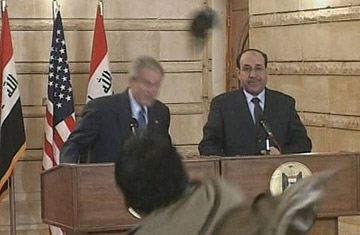
In this image from APTN video, a man, center, throws a shoe at US President George W. Bush, left, during a news conference with Iraq Prime Minister Nouri al-Maliki, Sunday, Dec. 14, 2008, in Baghdad
Beware of people throwing things at you in the Middle East, even shoes. Think David and Goliath or the Palestinian intifadeh — a rebellion set off by a thrown rock. Or better yet, think of the rocks thrown in Nabatiyah, Lebanon, on Oct. 16, 1983.
On that fateful day, a routine Israeli military patrol cut through a Shi'a religious procession, rocks flew, and the Israelis fired back. Two Lebanese were killed. The Israelis expected little to come of it, understanding too late just how frustrated the Lebanese Shi'a were — frustrated by their own government, by the Palestinians, by the Americans, by the French, as well as by the invading Israelis. Nabatiyah quickly metastasized into a vicious 17-year guerrilla war. It would turn out to be Hizballah's Boston Tea Party, and led to Israel's first defeat in the field of battle when Israel withdrew from Lebanon in 2000. For us, though, Nabatiyah should be a crucial lesson in how a small act of defiance can turn into a viral contagion. (See the top 10 awkward moments of 2008.)
The man who threw the pair of shoes at President Bush on Sunday was a Shi'a Arab who for years has expressed his bitter frustration about the way things have gone in Iraq. Contacts in Iraq told me that the man came to despise the al-Maliki government because he believes it sold out not just to the U.S. but to Iran as well. He was furious that the al-Maliki government is fabulously corrupt and incompetent. How else can you explain the $100 billion of development money that disappeared down the rat holes in Washington and Baghdad? Or how the electricity and water shortages continue, as do the car bombs in Shi'a neighborhoods? And he is furious that the U.S. intends to abandon Iraq in three years, leaving a mess behind.
Whatever the merits of the shoe thrower's anger, the unfortunate truth is that the longer we stay in Iraq, the more we will be blamed for everything that goes wrong in that country. These problems will not be fixed before we are due to depart in 2011. Or maybe ever by any outsider. The military commander in Iraq, General Ray Odierno, recently said that U.S. forces may have to stay in Iraqi cities beyond the June 2009 agreed pull-out date. I can see Odierno's point: he doesn't want to be the one who leaves behind the mess. But the reality is he will be long retired and in the grave by the time Iraq is completely fixed.
We got rid of Saddam, and as incomplete as that may be, it is the best we can do, even if we were to stay in Iraq for the next hundred years. Unless we stick to the withdrawal schedule like a Swiss train, the odds go up that something like Sunday's shoe-throwing incident will cascade into a situation far beyond our control — an Iraqi Nabatiyah.
Baer, a former CIA field officer assigned to the Middle East, is TIME.com's intelligence columnist and the author of See No Evil and, most recently, The Devil We Know: Dealing with the New Iranian Superpower.
